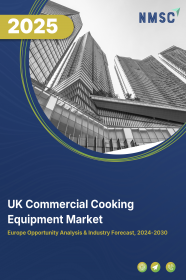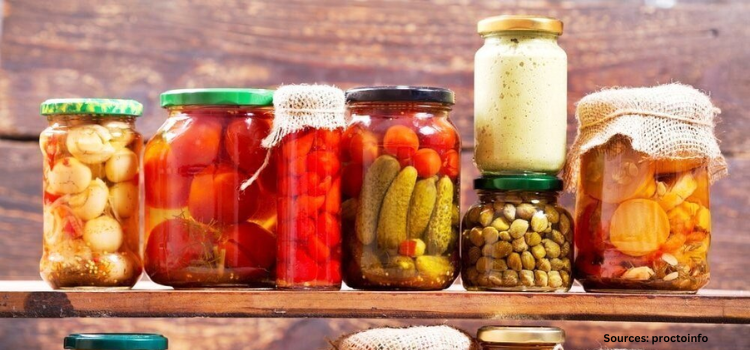
UK Commercial Cooking Equipment Market by Product Type (Broilers, Grills and Griddles, Cook Chill Systems, Refrigerators, Ovens, Dishwashers and Others), by Size (Small-Scale Equipment, Medium-Scale Equipment and Large-Scale Equipment), and by End-User (Full-Service Restaurants, Quick Service Restaurants, Catering, Railway Dining, Resorts & Hotel, Hospitals and Others)- Opportunity Analysis and Industry Forecast, 2024– 2030
Industry: Retail and Consumer | Publish Date: 12-Feb-2025 | No of Pages: 113 | No. of Tables: 80 | No. of Figures: 45 | Format: PDF | Report Code : RC2957
US Tariff Impact on UK Commercial Cooking Equipment Market
Trump Tariffs Are Reshaping Global Business
UK Commercial Cooking Equipment Market Overview
The UK Commercial Cooking Equipment Market size was valued at USD 370.7 million in 2023, and is predicted to reach USD 510.8 million by 2030, at a CAGR of 4.2% from 2024 to 2030. In terms of volume, the market size was 54 thousand units in 2023, and is projected to reach 94 thousand units by 2030, with a CAGR of 7.4% from 2024 to 2030.
Commercial cooking equipment encompasses a variety of appliances and tools crafted for professional kitchens in restaurants, hotels, and catering businesses. Designed for efficiency and safety, this equipment is built with durable materials to endure continuous use, reducing downtime and ensuring a seamless kitchen workflow. Modern designs emphasize energy efficiency, helping businesses lower utility costs and environmental impact. Investing in top-tier hospitality cooking equipment is essential for maintaining smooth operations, enhancing competitiveness, and boosting profitability in the food service industry.
Expansion of Leading Hotel Groups Drives Growth in Commercial Cooking Equipment Market
The UK hospitality sector is experiencing robust growth driven by major hotel chains like Bespoke and Premier Inn, leading to increased demand for hospitality cooking equipment (CCE). These expansions necessitate modern kitchen infrastructure to support their operations, propelling the UK commercial cooking equipment market forward. Bespoke Hotels, the largest independent hotel group in the UK, has outlined ambitious plans for 2024, including new openings and refurbishments. These developments not only create the UK commercial cooking equipment market trends for CCE suppliers but also highlight the growing need for advanced kitchen solutions to cater to the evolving preferences of guests. As Bespoke Hotels expands, it signifies a promising avenue for suppliers to capitalize on the burgeoning UK hospitality market and thereby driving the market growth.
Hospitality Industry Boosts Commercial Cooking Equipment Market Expansion in UK
The UK hospitality sector, encompassing restaurants, hotels, cafes, catering services, and institutional kitchens, significantly propels the demand for hospitality cooking equipment. Contributing over USD 118.25 billion to the UK economy in 2023 alone, this vibrant industry underscores the necessity for modern and efficient cooking appliances. These are essential to support seamless food preparation and service operations, catering to businesses' efforts to elevate the dining experience for their clientele. Investments in advanced cooking equipment aimed at ensuring high-quality food production, consistency, and operational efficiency further amplify the growth prospects of the UK's commercial cooking equipment market.
Stringent Regulatory Requirements and Compliance Standards Hinder the Market Growth
Stringent regulatory requirements, such as the International Food Standards (IFS) and the Food Safety Modernization Act (FSMA), pose significant challenges for businesses investing in new food service equipment. These regulations, enforced by governmental agencies and industry associations, mandate specific protocols for food handling, storage, and preparation to ensure safety and compliance. Non-compliance can lead to penalties and reputational damage.
Moreover, meeting emissions standards necessitates investments in ventilation and filtration systems, increasing complexity and costs. These regulatory burdens, combined with the financial strain of purchasing compliant equipment and ongoing maintenance, particularly impact small and medium-sized enterprises (SMEs). Ultimately, these challenges hinder the adoption of new cooking equipment, constraining the UK commercial cooking equipment market growth and expansion in the food service industry.
Integration Of Advanced Technologies in CCE Creates Future Market Prospects
Incorporating advanced technologies such as smart cooking appliances, IoT-enabled kitchen equipment, and automation solutions are poised to drive increased the UK commercial cooking equipment demand for hospitality cooking equipment. These innovations improve efficiency, productivity, and sustainability by enabling precise monitoring and control of cooking processes, real-time data analysis for informed decision-making, and automation of repetitive tasks.
This integration enhances operational efficiency, reduces energy consumption, minimizes waste, and aligns with the growing preference for sustainable practices in the food service industry.
Competitive Landscape
The key players operating in the UK commercial cooking equipment industry include Illinois Tool Works Inc (Vulcan), AFE GROUP LIMITED, WELBILT UK LIMITED, AB Electrolux, HOSHIZAKI EUROPE LIMITED, Falcon Foodservice, Adexa Direct Ltd., Euro Caterin, ITW Food Equipment Group, AFE Group Limited, and others.
UK Commercial Cooking Equipment Market Key Segments
By Product Type
-
Broilers
-
Grills and Griddles
-
Cook Chill Systems
-
Refrigerators
-
Ovens
-
Dishwashers
-
Others
By Size
-
Small-Scale Equipment
-
Medium-Scale Equipment
-
Large-Scale Equipment
By End-User Industry
-
Full-Service Restaurants
-
Quick Service Restaurants
-
Catering
-
Railway Dining
-
Resorts & Hotel
-
Hospitals
-
Others
Key Players
-
Illinois Tool Works Inc (Vulcan)
-
AFE GROUP LIMITED
-
WELBILT UK LIMITED
-
AB Electrolux
-
HOSHIZAKI EUROPE LIMITED
-
Falcon Foodservice
-
Adexa Direct Ltd.
-
Euro Caterin
-
ITW Food Equipment Group
-
AFE Group Limited
REPORT SCOPE AND SEGMENTATION:
|
Parameters |
Details |
|
Market Size in 2023 |
USD 370.7 Million |
|
Revenue Forecast in 2030 |
USD 510.8 Million |
|
Growth Rate |
CAGR of 4.2% from 2024 to 2030 |
|
Market Volume in 2023 |
54 thousand Units |
|
Market Forecast in 2030 |
94 thousand Units |
|
Volume Growth Rate |
CAGR of 7.4% from 2024 to 2030 |
|
Analysis Period |
2023–2030 |
|
Base Year Considered |
2023 |
|
Forecast Period |
2024–2030 |
|
Market Size Estimation |
Million (USD) |
|
Market Volume Estimation |
Thousand Units |
|
Growth Factors |
|
|
Companies Profiled |
10 |
|
Market Share |
Available for 10 companies |
|
Customization Scope |
|
|
Pricing and Purchase Options |
Avail customized purchase options to meet your exact research needs. |

















 Speak to Our Analyst
Speak to Our Analyst





















